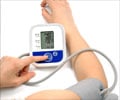New study has offered insights gained from ambulatory blood pressure monitoring, which is conducted while people go about their daily activities, including during sleep.

‘A high proportion of people with kidney disease have high blood pressure when measured outside of the doctor’s office.’





Also, among participants with kidney disease, uncontrolled ambulatory blood pressure was associated with a higher prevalence of left ventricular hypertrophy, a marker of cardiovascular disease. In another study that followed 1,502 adults with chronic kidney disease for 4 years, Lama Ghazi, MD (University of Minnesota) and her colleagues found that ambulatory blood pressure patterns were not linked with cognitive impairment or frailty.
“However, among participants older than 60 years, those who demonstrated at least a 20% drop in average systolic blood pressure from day to night—called extreme dippers—had a higher risk of developing cognitive impairment,” said Dr. Ghazi. Also, participants with masked hypertension (normal clinic-measured blood pressure but elevated ambulatory blood pressure) had worse physical functioning than participants with hypertension controlled with medication.
Dr. Ghazi noted that future research should assess links between ambulatory blood pressure and physical and cognitive function over a longer follow-up period.
Source-Newswise















